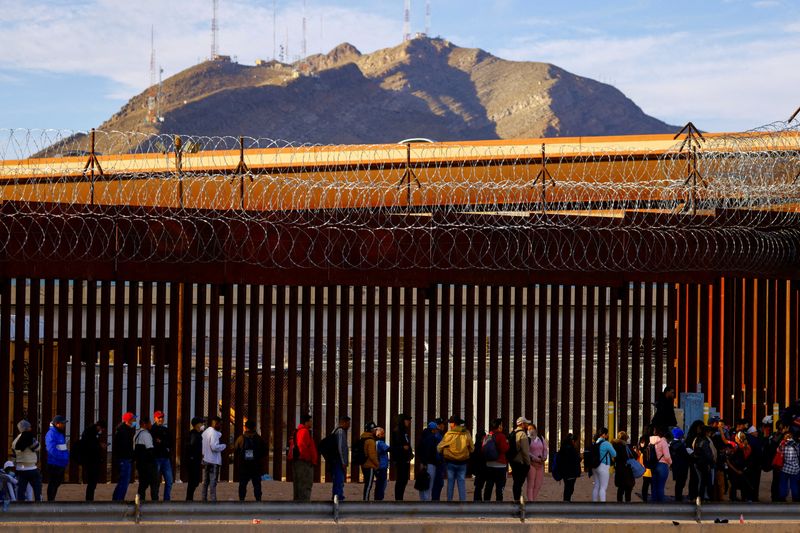By Ted Hesson
WASHINGTON (Reuters) -The United States could bar tens of thousands of migrants arriving at the U.S.-Mexico border from claiming asylum under a proposal unveiled on Tuesday that would be the most wide-ranging attempt yet by U.S. President Joe Biden's administration to deter unauthorized crossings.
Under the new rules, migrants who do not schedule an appointment at a U.S. border port of entry or use humanitarian programs available to certain nationalities would be ineligible for asylum except in certain cases. They must also first seek and be denied protection in countries they pass through to be able to claim asylum once in the United States.
Reuters first reported details of the measure, which was posted online on Tuesday and will be subject to a 30-day public comment period before being reviewed for final publication.
Biden, a Democrat who took office in 2021 and is expected to seek re-election in 2024, initially pledged to restore asylum access that was curtailed under his Republican predecessor, Donald Trump. But advocates and some fellow Democrats have criticized him for increasingly embracing Trump-style restrictions as he has struggled to cope with record numbers of arriving migrants.
Biden's plan to ban certain asylum seekers mirrors similar efforts under Trump that were blocked by federal courts and has drawn similar opposition.
The American Civil Liberties Union (ACLU) vowed to fight the Biden rule in court, comparing it to the Trump restriction, which was dubbed a "transit ban" by activists.
"We successfully sued to block the Trump transit ban and will sue again if the Biden administration goes through with its plan," said Lee Gelernt, the ACLU attorney who argued the Trump-era lawsuit.
Families and single adults would be subject to the restrictions while unaccompanied minors would be exempt, according to the rule, issued jointly by the U.S. Department of Homeland Security (DHS) and U.S. Department of Justice (DOJ). The measure would be temporary and limited to a period of two years, with the possibility to extend it.
Karen Musalo, director of the Center for Gender and Refugee Studies at the University of California College of the Law, San Francisco, said the Biden proposal ignores dangerous conditions and limited asylum capacity in transit countries where migrants will be expected to seek protection.
"It's a terrible example of trying to flout your domestic and international legal obligations," she said.
'FILL THE VOID'
The Biden administration began discussing the ban and other Trump-style measures last year as a way to reduce illegal crossings if COVID-era restrictions allowing many migrants to be expelled back to Mexico ended. The administration is moving ahead with tougher asylum rules as the COVID restrictions, known as Title 42, appear likely to sunset on May 11 when the COVID-19 public health emergency terminates.
"Without a meaningful policy change, border encounters could rise, and potentially rise dramatically" after the lifting of Title 42, the text of the proposed rule said, estimating crossings could reach up to 13,000 per day without the COVID restrictions, up from a daily average of about 5,000 in January.
A Biden administration official, who declined to be named, told reporters that the rule "is intended to fill the void that Congress has left by taking no action" to overhaul immigration laws or increase border security funding.
Mexican authorities did not respond to requests for comment.

Biden expanded Title 42 in January to expel additional nationalities while allowing some people from those countries to apply for legal entry by air via humanitarian parole if they have U.S. sponsors. The parole program, for up to 30,000 Cuban, Haitian, Nicaraguan and Venezuelan migrants per month, would be one of the legal pathways the administration says would allow asylum-seekers to circumvent the proposed restrictions.
Separately, migrants seeking asylum at the U.S.-Mexico border could schedule an appointment at a U.S. land port of entry using an app called CBP One. But since the CBP One effort launched in January, migrants say slots have filled up quickly.